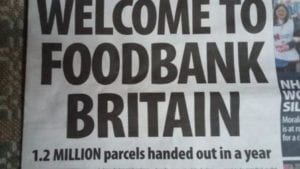It has long been the case that the families of children in the UK who get free school meals struggle to feed them during the school holidays when there are no free lunches. That is why in a number of places there are lunch and activity clubs, such as one I observed in north London, run by charities and volunteers. But these can only meet a fraction of the need.
With the onset of the pandemic, even more people than before have found themselves in a situation of food insecurity. Food banks and other charities have experienced a huge increase in demand which initially they found difficult to meet. During the first lockdown beginning in March the government did provide vouchers to families of children normally in receipt of free school meals during the Easter holidays but once children returned to school, Westminster refused to continue doing this.
Enter Marcus Rashford, a footballer who plays for Manchester United and England, and who found this situation unacceptable. In March, he joined forces with the food redistribution charity FareShare and became its ambassador.
FareShare started primarily as a charity seeking to deal with food waste and prevent it going to landfill by redistributing it from the food industry to the charitable sector. It has a partnership with Tesco through its FareShare Food Cloud project. It does not, however, campaign around the reasons for food poverty. On its current website it states as follows:
by collecting food that would otherwise go to waste and redistributing it to charity and community groups, FareShare creates approximately £50.9 million of social-economic impact each year. This is made up of £6.9 million in social value to the beneficiaries themselves and £44 million in savings to the State (i.e. to the NHS, the criminal justice system, to schools and social care). – FareShare impact statement
Rashford received both food and monetary donations from many businesses, especially those based in the north, and also support from some local councils which, although hard-pressed financially, vowed that they would support holiday meals schemes.
Rashford spoke publicly and eloquently about his own childhood spent in poverty when his family relied on food banks to tide them over. Because he is a celebrity, his arguments resonated with the public and the petition he set up soon gained many signatures.
On June 15th, he wrote a letter to all MPs, urging them to ‘find their humanity’; the following day he was phoned by PM Johnson. The government did a U-turn and agreed that the meals voucher scheme should continue over the summer holidays. For his campaigning work, Rashford was awarded an MBE in the Queen’s Birthday Honours List 2020. He also received a number of other awards, including a special one from ‘Sportsperson of the Year’ and another from the city of Manchester. No wonder so many companies have sought to partner with Rashford, including the high-end chain Burberry.
In October, Labour put forward a motion in the House of Commons urging the government to continue the free school meals holiday scheme until Easter 2021. The debate was lengthy and impassioned. Most government speakers argued that this motion should not be supported, with one MP talking of the risk of ‘nationalising children’ and others of encouraging a ‘culture of dependency’. The motion was defeated by 322 to 261. Rashford tweeted ’A significant number of children are going to bed tonight not only hungry but feeling like they do not matter because of comments that have been made today.’ (The Guardian)
By November Rashford’s petition had well over a million signatures and the coverage of his campaign was extensive, ranging from national broadcast, print and social media to local newspapers and sports papers. He had become a national hero, including to schoolchildren.
The PM spoke again to Rashford on Sat. 7th November and told him that the government had pledged an extra £170m to help struggling families, in effect another u-turn.
Rashford was diplomatic in his response, welcoming the government aid but several charities pointed out that the sum allocated actually represented a relatively small amount given the size of the need. Furthermore, it was apparent by the end of November that many families on Universal Credit were to have their benefits capped in December after a 9-month ‘grace‘ period following job losses in March. It was also noted that those on Universal Credit were due to lose the temporary increase of £20 per week announced at the start of the pandemic in the spring of 2021. Thus while the government appeared to be giving with one hand, it was taking away with the other.
So what to make of the contention that a 23-year old footballer was in effect ‘running an alternative government’? An exaggeration perhaps but it demonstrates several points.
The first is that Rashford’s power as a celebrity allowed considerable amplification of voices supporting this cause. He acted as a catalyst for a campaign to provide free school meals during school holidays.
The second is that Rashford was quite clear that although charities like FareShare and food banks could help in this situation, it was ultimately the responsibility of the government. Yet while successfully shaming the latter into finding more money for much-needed items such as children’s holiday lunches is highly laudable, the government needs to be pushed much further into making some real changes which would allow people to buy their own food rather than relying on food banks or even government hand-outs.
Thirdly, Rashford’s intervention has played into an already changing public view of entitlement. For the past two decades, polls had shown that there was less support for social welfare than there used to be. Recently, However, this has changed, with the most recent British Social Attitudes Survey revealing that there is 20-year high in increased support for benefits, perhaps fed not only by campaigns but now also by an increasing awareness of the ever-greater problems of unemployment and poverty following the onset of the pandemic. Most people now know someone who has lost their job and has had to turn to social welfare, only to find how meagre it is and how difficult to access.
While some charities still argue that their contribution to food poverty and poverty more generally is through their provision of food and meals, mainly sourced from the food industry, others are becoming more critical of the wider situation and the way in which food charities effectively let the government off the hook. There has been a change of tone on the part of some charities which address poverty and food poverty, with a marked increase in advocacy and activism.
IFAN (independent Food Aid Network) has long advocated for ‘the changes that would reduce the need for charitable food aid’. In a recent blog, IFAN’s Coordinator, Sabine Goodwin has argued that, given the increased public awareness of and greater sympathy for the plight of those in food poverty (partly as a result of the Marcus Rashford campaigns), now is the time to take things further and address the real reasons why people suffer from food poverty.
The Trussell Trust, the UK’s largest food bank franchise, began to change its messaging a couple of years ago, and has been pushing hard since then for a change in the 5-week wait for Universal Credit. Recently it has gone further with its campaign ‘Hunger Free Future’, demonstrating that it is now willing to address some of the real reasons for food poverty and fight to change them.
Basically, the food-insecure are suffering from poverty, that is, inadequate income. This is due not only to unemployment but also low social welfare benefits, caps and cuts in benefits, delays in receiving same, low wages, zero-hours contracts, unemployment. It is the state which needs to act in each of these areas to make sure that every individual and family receives an income sufficient to buy good and sufficient food. This is their right as citizens.
 Beneath the anxiety and upheaval that the prospect of Brexit has brought to Wales, threatening as it does to cut off export markets for farmers, change the face of support for rural development and weaken our sovereignty if power passes back to London, runs a current of hope. As long-term assumptions about food, farming and the environment are shaken, so opportunities arise for fresh thinking.
Beneath the anxiety and upheaval that the prospect of Brexit has brought to Wales, threatening as it does to cut off export markets for farmers, change the face of support for rural development and weaken our sovereignty if power passes back to London, runs a current of hope. As long-term assumptions about food, farming and the environment are shaken, so opportunities arise for fresh thinking.